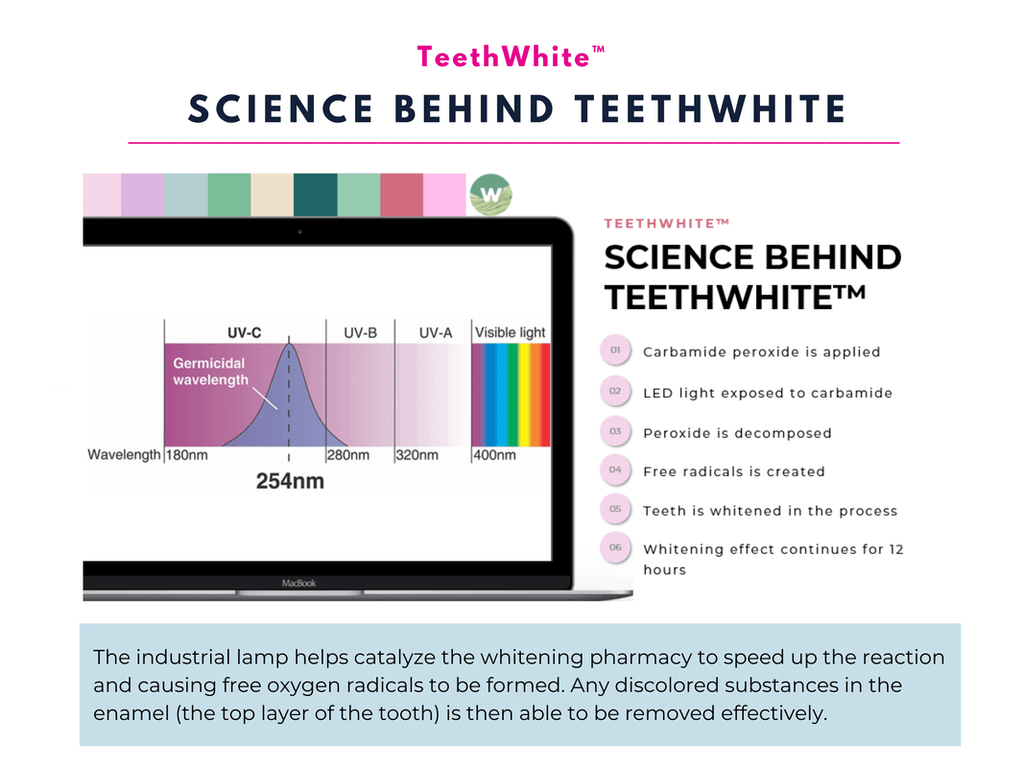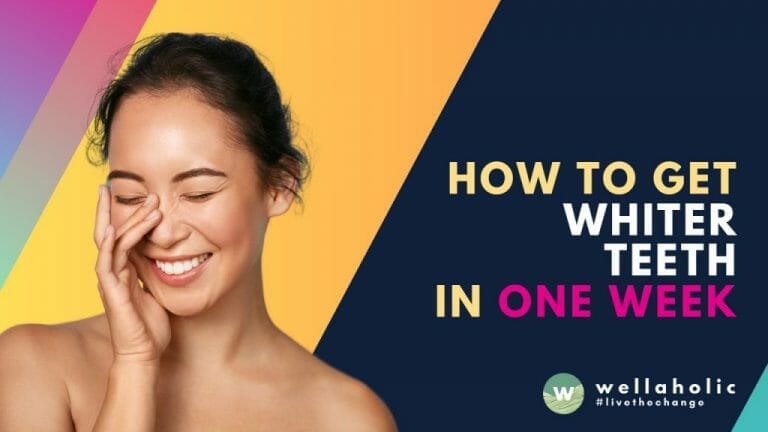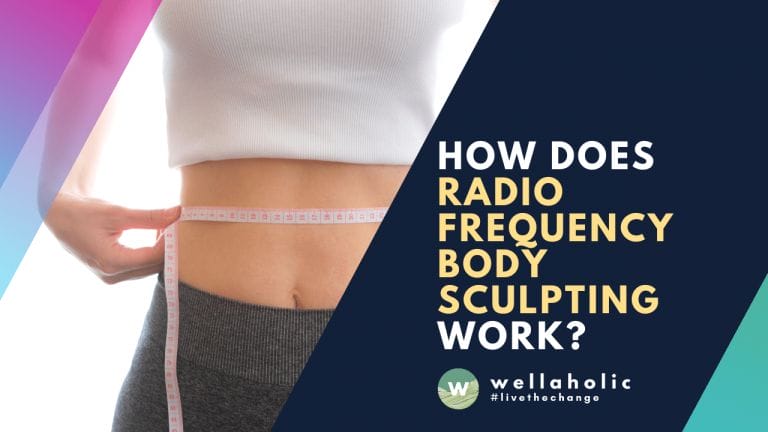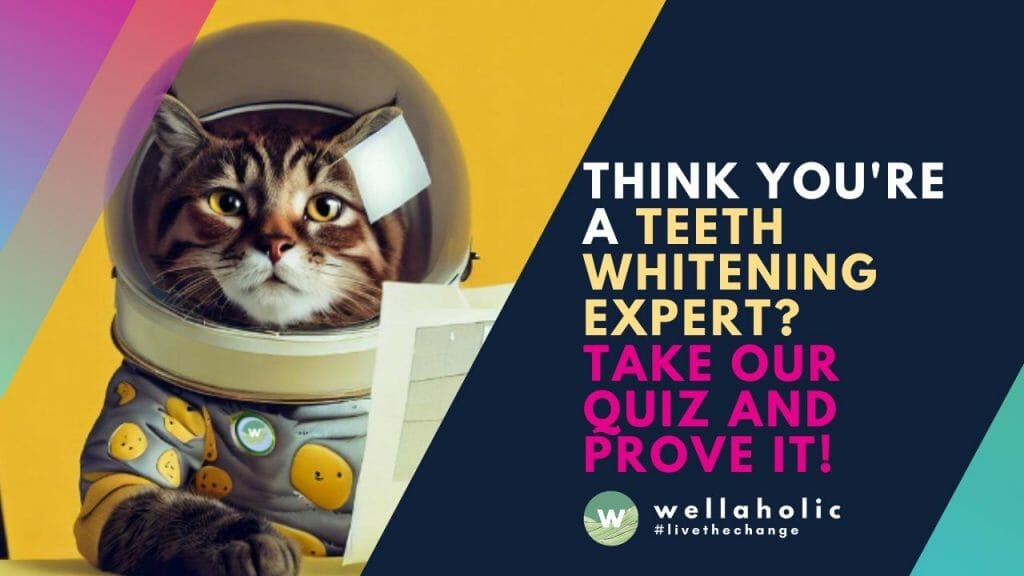
Think you’re a teeth whitening expert? Take our quiz and prove it!
Think you’re an expert on Teeth Whitening?
As the Aesthetic Director at Wellaholic, I’ve seen countless clients come in for teeth whitening treatments. Many think they know all about it, but there’s often more to learn. From my years in the industry, I’ve noticed common misconceptions about teeth whitening. Some believe it’s a one-time fix, while others worry it’ll damage their teeth.
I’ve created a quiz to test your knowledge on teeth whitening. It covers everything from how it works to aftercare tips. Whether you’re a first-timer or a regular, this quiz will challenge what you know.
In the rest of this article, I’ll break down the answers and share some insider tips. Get ready to put your teeth whitening expertise to the test!
Take the Teeth Whitening Quiz Now!
Think you know everything there is to know about teeth whitening? Why not put your knowledge to the test and take our teeth whitening quiz? Our quiz is designed to challenge your understanding of teeth whitening, covering a range of topics from the science behind it to the different products available on the market. By taking our quiz, you can not only see how much you already know about teeth whitening, but also learn new tips and tricks to improve your teeth whitening game. So, what are you waiting for? Take the teeth whitening quiz now and see if you’re a true teeth whitening expert!


How much do you know about teeth whitening?
Take this 5-question quiz now
Key Benefits
- ●Brighten your smile by up to 10 shades ✨
- ●Quick and painless results ⏱️
- ●Safe, FDA‐approved procedure ✅
- ●Long‐lasting effects with proper care 💎
Q1: What is one common cause of tooth discoloration? 🦷
- ●A: Food and beverage staining
- ●B: Poor dental hygiene
- ●C: Tobacco use
- ●D: All of the above
Show Answer & Explanation
Correct Answer: D
Explanation: Factors like food, poor oral hygiene and tobacco use all contribute to tooth discoloration.
Q2: How long does a typical teeth whitening procedure last? ⏲️
- ●A: 15–20 minutes
- ●B: 30–45 minutes
- ●C: 60–90 minutes
- ●D: Over 2 hours
Show Answer & Explanation
Correct Answer: A
Explanation: Most professional teeth whitening sessions usually take 15–20 minutes.
Q3: What is a key benefit of professional teeth whitening? 😁
- ●A: Immediate improvement in smile brightness
- ●B: Reduced tooth sensitivity
- ●C: Even, natural-looking results
- ●D: All of the above
Show Answer & Explanation
Correct Answer: D
Explanation: Professional treatments offer immediate enhancement, minimise sensitivity and deliver even, natural results.
Q4: Which ingredient is most commonly used in teeth whitening gels? 💎
- ●A: Hydrogen peroxide
- ●B: Carbamide peroxide
- ●C: Sodium bicarbonate
- ●D: Baking soda
Show Answer & Explanation
Correct Answer: A
Explanation: Hydrogen peroxide is the most common active ingredient due to its powerful oxidising action.
Q5: How long do the effects of a professional teeth whitening treatment usually last? 🔄
- ●A: 6 months
- ●B: 1 year
- ●C: 2–3 years
- ●D: Permanent
Show Answer & Explanation
Correct Answer: C
Explanation: With proper care and lifestyle adjustments, the whitening effect can last 2–3 years.
Or if you prefer to read text, you can test yourself with the 10-question quiz below:
Q1: What is the main cause of tooth discoloration?
- a) Aging
- b) Smoking
- c) Drinking coffee or tea
- d) All of the above
Correct answer: d) All of the above
Explanation: Tooth discoloration can be caused by various factors, such as aging, smoking, drinking coffee or tea, and consuming certain foods or medications. These factors can stain the enamel (the outer layer of the tooth) or the dentin (the inner layer of the tooth).
Q2: What is the difference between intrinsic and extrinsic stains?
- a) Intrinsic stains are on the surface of the tooth, while extrinsic stains are inside the tooth
- b) Intrinsic stains are inside the tooth, while extrinsic stains are on the surface of the tooth
- c) Intrinsic stains are permanent, while extrinsic stains are temporary
- d) Intrinsic stains are temporary, while extrinsic stains are permanent
Correct answer: b) Intrinsic stains are inside the tooth, while extrinsic stains are on the surface of the tooth
Explanation: Intrinsic stains are caused by factors that affect the internal structure of the tooth, such as trauma, infection, medication, or fluorosis. Extrinsic stains are caused by factors that affect the external surface of the tooth, such as food, drinks, tobacco, or plaque.
Q3: What is the most common method of teeth whitening?
- a) Bleaching
- b) Veneers
- c) Crowns
- d) Bonding
Correct answer: a) Bleaching
Explanation: Bleaching is a process that uses a chemical agent (usually hydrogen peroxide or carbamide peroxide) to whiten the teeth. Bleaching can be done at home with over-the-counter products or at a dental office with professional products.
Q4: What are some disadvantages of bleaching your teeth at home?
- a) It may take longer to see noticeable results than bleaching at a dental office.
- b) It may cause tooth sensitivity or gum irritation if used incorrectly or excessively.
- c) It may not be effective for some types of stains or for people with certain dental conditions.
- d) All of the above
Answer: d) All of the above
Explanation: Bleaching your teeth at home may have some drawbacks compared to bleaching at a dental office. It may take longer to see noticeable results because home products usually have lower concentrations of bleaching agents than professional products. It may also cause tooth sensitivity or gum irritation if you use too much product, leave it on for too long, or apply it unevenly. Additionally, it may not be effective for some types of stains (such as intrinsic stains) or for people with certain dental conditions (such as cavities, gum disease, or restorations).
Q5: What are some advantages of crowns for teeth whitening?
- a) They can restore severely damaged or decayed teeth that cannot be treated by bleaching or veneers.
- b) They can protect the underlying tooth structure from further damage or infection.
- c) They can match the color and shape of the natural teeth or improve them if desired.
- d) All of the above
Answer: d) All of the above
Explanation: Crowns can have some advantages over other methods of teeth whitening. They can restore severely damaged or decayed teeth that cannot be treated by bleaching or veneers. They can also protect the underlying tooth structure from further damage or infection by covering it completely. Moreover, they can match the color and shape of the natural teeth or improve them if desired by using different materials and techniques.
Q6: What are some tips to maintain your teeth whitening results?
- a) Brush your teeth twice a day with a fluoride toothpaste and floss daily.
- b) Rinse your mouth with water after eating or drinking anything that can stain your teeth.
- c) Avoid smoking and limit your intake of foods and drinks that can stain your teeth, such as coffee, tea, wine, berries, or sauces.
- d) All of the above
Answer: d) All of the above
Explanation: To maintain your teeth whitening results, you should follow good oral hygiene practices and avoid habits that can stain your teeth. You should brush your teeth twice a day with a fluoride toothpaste and floss daily to remove plaque and bacteria that can cause discoloration. You should also rinse your mouth with water after eating or drinking anything that can stain your teeth to prevent them from sticking to your enamel.
Q7: How does laser teeth whitening work?
- a) The dentist applies a protective gel or rubber shield to the gums and lips to prevent them from being exposed to the laser or the bleaching agent.
- b) The dentist applies a thin layer of bleaching agent to the teeth and activates it with a laser beam.
- c) The dentist repeats the process until the desired shade of whiteness is achieved.
- d) All of the above
Answer: d) All of the above
Explanation:
Laser teeth whitening works by following these steps:
- The dentist applies a protective gel or rubber shield to the gums and lips to prevent them from being exposed to the laser or the bleaching agent.
- The dentist applies a thin layer of bleaching agent to the teeth and activates it with a laser beam. The laser beam heats up and breaks down the bleaching agent, which releases oxygen that whitens the teeth.
Q8: How long does laser teeth whitening last?
- a) A few days
- b) A few weeks
- c) A few months
- d) A few years
Answer: c) A few months
Explanation: Laser teeth whitening can last for a few months, depending on the individual’s oral hygiene and lifestyle habits. The whitening effect can fade over time due to factors such as aging, smoking, drinking coffee or tea, or eating staining foods. To maintain the whitening results, it is recommended to brush and floss regularly, rinse with water after eating or drinking anything that can stain the teeth, avoid smoking and limit staining foods and drinks, and visit the dentist for regular check-ups and touch-ups.
Q9: What are some side effects of laser teeth whitening?
- a) Tooth sensitivity
- b) Gum irritation
- c) Tooth damage
- d) All of the above
Answer: d) All of the above
Explanation: Laser teeth whitening can cause some side effects, such as tooth sensitivity, gum irritation, or tooth damage. Tooth sensitivity is a common and temporary side effect that occurs when the bleaching agent penetrates the enamel and exposes the dentin, which contains nerve endings. Gum irritation is another common and temporary side effect that occurs when the bleaching agent or the laser comes in contact with the gums. Tooth damage is a rare and serious side effect that occurs when the laser overheats or burns the tooth structure, which can lead to pain, infection, or tooth loss.
Q10: Who is not a good candidate for laser teeth whitening?
- a) Someone who has unhealthy teeth and gums with cavities, gum disease, crowns, veneers, fillings, or allergies to peroxide.
- b) Someone who has severe or deep intrinsic stains caused by trauma, medication, or fluorosis.
- c) Someone who has unrealistic expectations or does not understand the risks and benefits of the procedure.
- d) All of the above
Answer: d) All of the above
Explanation:
- A bad candidate for laser teeth whitening is someone who meets the following criteria:
- Someone who has unhealthy teeth and gums with cavities, gum disease, crowns, veneers, fillings, or allergies to peroxide. These conditions can affect the outcome or safety of the procedure and may require other treatments before or instead of laser teeth whitening.
- Someone who has severe or deep intrinsic stains caused by trauma, medication, or fluorosis. These stains may not respond well to laser teeth whitening and may require other treatments such as veneers or crowns.
- Someone who has unrealistic expectations or does not understand the risks and benefits of the procedure. Laser teeth whitening cannot change the natural color or shape of the teeth and can cause some side effects such as tooth sensitivity or gum irritation.
How did you score for the Teeth Whitening quiz?
So, you’ve just completed the quiz on laser teeth whitening and you’re curious to know how you did. Well, don’t worry, we’ve got you covered. Here’s a quick breakdown of what your score means and what you can do to improve your knowledge and smile.
We hope you enjoyed this quiz and learned something new about laser teeth whitening. Remember, knowledge is power, especially when it comes to your oral health and appearance. If you have any questions or concerns about laser teeth whitening, feel free to contact us or book an appointment with one of our friendly and professional consultants. We’re here to help you achieve your best smile ever.
Basics of Teeth Whitening
Why whiten your teeth? Do you want a smile that sparkles and shines? You’re not the only one. A lot of people are unhappy with how their teeth look and feel. They want to boost their appearance and confidence. Teeth whitening is a common and cheap way to make your teeth look better. But what is teeth whitening and how does it work? Here are some basic things you need to know before you try it.
What causes teeth to stain? Teeth can get stained or discolored for different reasons. There are two main kinds of stains that can change the color of your teeth: extrinsic and intrinsic. Extrinsic stains are from things that touch your enamel (the hard part of your tooth), like food, drinks, tobacco, or plaque. Intrinsic stains are from things that affect your dentin (the soft part of your tooth), like injury, infection, medicine, or fluoride.
How can you whiten your teeth? There are two main ways to whiten your teeth: bleaching and non-bleaching. Bleaching is a way that uses a chemical (usually hydrogen peroxide or carbamide peroxide) to whiten your teeth by breaking down the stains and letting out oxygen. Non-bleaching is a way that uses physical or mechanical ways (like scraping, polishing, or rubbing) to remove the stains from the top of your teeth.
Where can you whiten your teeth? You can whiten your teeth at home or at a dentist’s office, depending on what you want, how much you can spend, and how your teeth are. Home teeth whitening products include strips, trays, gels, pens, or toothpastes that have a little bit of bleaching chemical that you can use yourself by following the directions. Dentist’s office teeth whitening products include professional bleaching chemicals that have a lot of bleaching chemical that are used by a dentist with special tools and methods.
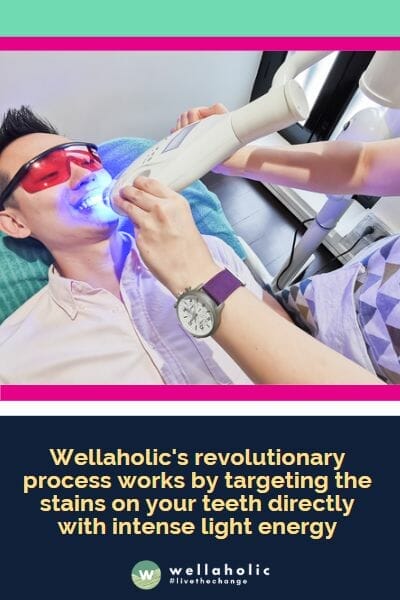
Tips for improving your knowledge on teeth whitening
Here’s how you can improve your knowledge on teeth whitening:
How to learn more about teeth whitening Do you want to know more about teeth whitening and how it can help you get a better smile? There are many ways to improve your knowledge on this topic and make informed decisions about your oral health and appearance. Here are some tips to help you learn more about teeth whitening.
Read reliable sources of information One of the best ways to learn more about teeth whitening is to read reliable sources of information, such as websites, blogs, books, or magazines that are written by experts or professionals in the field. You can find a lot of useful and accurate information about the different types, methods, benefits, risks, and costs of teeth whitening.

“A dental cleaning is the foundation for a brighter, healthier smile!”

Serene Chiam, Aesthetic Director
Serene Chiam is the Aesthetic Director at Wellaholic, a well-known aesthetic chain in Singapore. She has more than ten years of experience in the aesthetics industry. With a Bachelor of Health Science (Aesthetics) and CIDESCO certifications, she expertly combines scientific knowledge with practical skills. Serene is known for her personalized approach to beauty, ensuring each Wellaholic client’s journey is unique and transformative. Her significant contributions have been pivotal in establishing Wellaholic’s reputation for excellence in aesthetic wellness.
Contact Serene at support@wellaholic.com
GET IN TOUCH
Book Now Pay Later
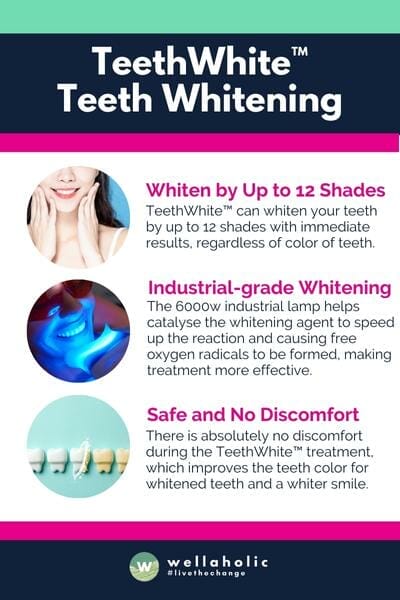
TeethWhite™ Teeth Whitening – Get Up to 12 Shades Whiter
- ⭐ Immediate Results. TeethWhite™ brightens your smile up to 12 shades in a single session, offering an instant boost to your confidence.
- ⭐ Industrial-Grade Whitening. TeethWhite™ teeth whitening employs industrial-grade lamps for optimal whitening results.
- ⭐ Effective Ingredients: Our teeth whitening gel features Carbamide Peroxide, a proven and potent whitening agent.
- ⭐ Advanced technology: TeethWhite™ uses strong LED light technology to activate the whitening gel and ensure thorough and consistent results.
- ⭐ Award-Winning. Wellaholic’s treatments have been recognized by top beauty publications such as Daily Vanity, Beauty Insider, and Tropika Club Magazine.
- ⭐ Over 2000 Verified Customer Reviews. Wellaholic has over 30 industry awards and over 2000 positive reviews from customers, and >50% are repeat customers.
